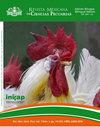Efectos del suero ácido sobre la calidad química fermentativa y la estabilidad aeróbica del ensilado de grano de maíz rehidratado
IF 0.6
4区 农林科学
Q3 AGRICULTURE, DAIRY & ANIMAL SCIENCE
引用次数: 0
Abstract
The objective was to evaluate the fermentative, chemical characteristics and aerobic stability of corn grain silages rehydrated with whey fluid (WF) or whey powder (WP) and water, with or without the addition of inoculant (I). The corn grain was ground and hydrated adding water without chlorine and/or whey to reach 35 % humidity and stored in silos of 4.36 kg. After 45 d of fermentation, samples of the silages were submitted to chemical-fermentative analyses in opening of silos and 240 h of exposure to air. The aerobic stability of the silages was evaluating during 240 h has considered to the loss when the temperature of the ensiled mass exceeded the ambient temperature by 2 °C. A reduction in the acid detergent fiber (ADF) and lignin content of the silages was observed with the use of WF and WP. The levels of ammoniacal nitrogen (NH3-N) were the lowest for WF and WP (0.7 and 0.9 g/kg TN) and pH was 4.31 for WF after 240 h of aerobic exposure. The use of inoculants provided higher levels of Ash, ether extract (EE), and low buffering capacity (BC), in addition to reductions in ADF levels. The inoculated silages showed higher levels of NH3-N and pH after 240 h. The silage of corn grains rehydrated with WF provided ideal pH values, low NH3-N content, reduced levels of ADF and lignin, and improved aerobic stability. In addition to being a sustainable alternative, the use of fluid whey to rehydrate corn grains adds nutritional value and improves silage fermentation.酸性血清对复水玉米青贮粮发酵化学品质和好氧稳定性的影响
目的是评估添加或不添加接种物(I)的情况下,用乳清液(WF)或乳清粉(WP)和水再水合的玉米谷物青贮饲料的发酵、化学特性和需氧稳定性。玉米粒经过研磨和水合,加入不含氯和/或乳清的水,达到35%的湿度,并储存在4.36kg的筒仓中。发酵45天后,在筒仓开口和暴露在空气中240小时后,对硅烷样品进行化学发酵分析。当青贮料的温度超过环境温度2°C时,在240小时内评估的硅烷的需氧稳定性已考虑到损失。使用WF和WP观察到硅烷的酸性洗涤剂纤维(ADF)和木质素含量的降低。有氧暴露240小时后,WF和WP的氨氮(NH3-N)水平最低(0.7和0.9 g/kg TN),WF的pH为4.31。接种剂的使用除了降低ADF水平外,还提供了更高水平的灰分、醚提取物(EE)和低缓冲能力(BC)。接种后的青贮饲料在240小时后显示出较高的NH3-N水平和pH值。WF复水的玉米青贮饲料提供了理想的pH值、较低的NH3-N含量、降低的ADF和木质素水平,并改善了好氧稳定性。除了是一种可持续的替代品外,使用液态乳清对玉米粒进行再水合还能增加营养价值,改善青贮发酵。
本文章由计算机程序翻译,如有差异,请以英文原文为准。
求助全文
约1分钟内获得全文
求助全文
来源期刊

Revista Mexicana de Ciencias Pecuarias
AGRICULTURE, DAIRY & ANIMAL SCIENCE-
CiteScore
1.20
自引率
0.00%
发文量
93
审稿时长
>12 weeks
期刊介绍:
The MEXICAN MAGAZINE OF SCIENCES PECUARIAS is an organ of scientific and technical diffusion of the livestock sector. Its periodicity is quarterly and arbitrated by pairs in the double-blind mode. Its objective is to make known the results of the research carried out by any scientific institution, in Mexico and in any part of the world, related to the livestock sciences, particularly those that refer to the different disciplines of Veterinary Medicine and Animal Science. The Journal is bilingual, publishes the complete articles in Spanish or English and is included in various indexing services and international dissemination platforms, such as the Index of Mexican Journals of Scientific and Technological Research of the National Council of Science and Technology (CONACYT); In the EBSCO Host database; In the Network of Scientific Journals of Latin America and the Caribbean, Spain and Portugal (RedALyC); In the Ibero-American Network of Scientific Journals of Free Access Veterinary Medicine. Indexed in the ISI Journal Citation Report Science Edition; And Elsevier''s SCOPUS and EMBASE indices.
 求助内容:
求助内容: 应助结果提醒方式:
应助结果提醒方式:


